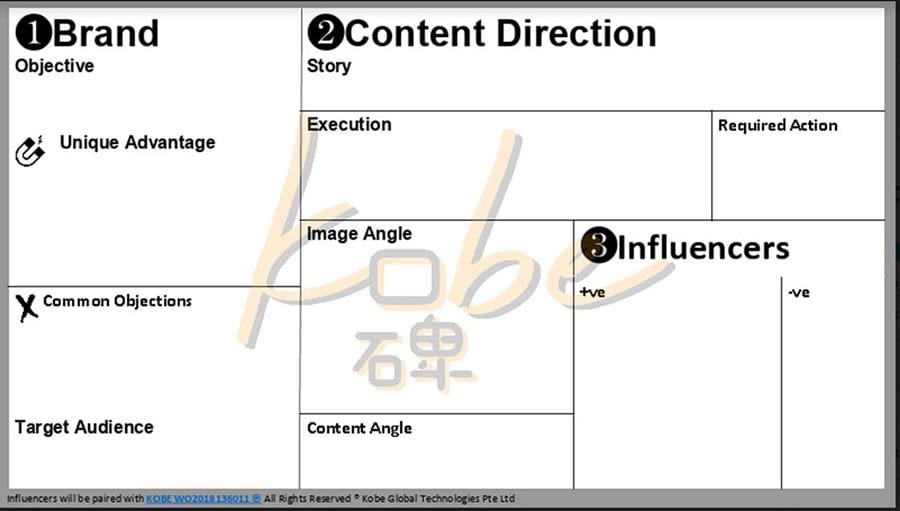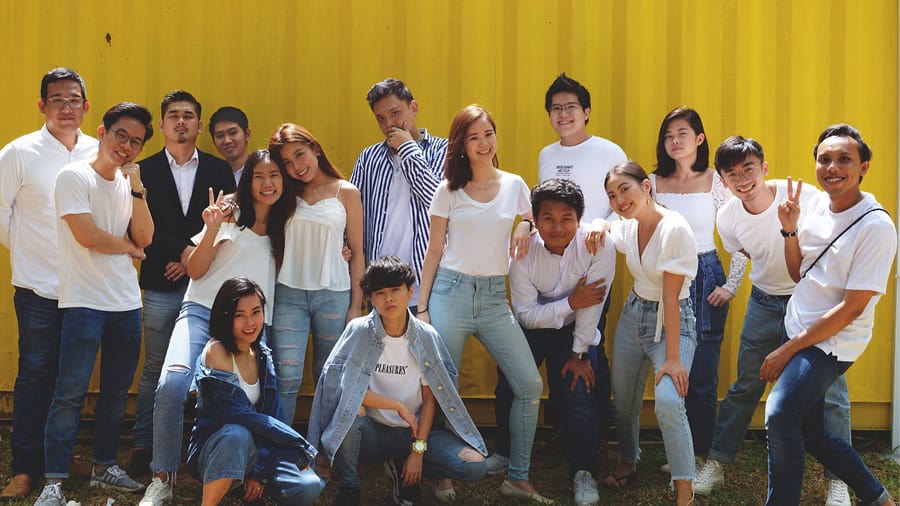Evangeline Leong, an entrepreneur with a passion for social media marketing founded Kobe Global Technologies where she sees a great potential in the digital marketing landscape, especially in empowering SMEs as they execute their innovative ideas. Together with Cha Lin, a veteran in influencer marketing, they created Kobe Global Technologies, a pending patent AI-driven advertising platform that pairs advertisers with relevant everyday influencers.
Our Parenting World – OPW Media team is pleased to be able to interview Evangeline Leong where she shared about her entrepreneur journey, how marketing has changed since the emergence of influencers for brands and industries, and how they can provide positive change and impact to others. Read on to find out more.

Exclusive Interview with Evangeline Leong, Director of Kobe Global Technologies
1. Please share with us more about your background and what were you doing before setting up Kobe Global Technologies?
I was a business director at PurpleClick. I spent close to 10 years here and this was the place where I got my years of business and digital marketing experience which had given me the confidence to start Kobe.
2. What inspired you to set up Kobe Global Technologies and how did you start up your business?
I was visiting a small wanton noodles stall in MacPherson and I was suddenly curious as to how the store owner managed to remain popular even with other competing stores opening. His answer to me really struck me “我的口碑好” (my word-of-mouth recommendation is good). That’s actually how I came up with the name Kobe. His answer was so simple but still significant as it made me think of how word-of-mouth could be made relevant to businesses everywhere.
Having worked in the digital marketing industry for almost 10 years, the most effective tool for marketing remains as word of mouth. Social media has liberated the speed of word of mouth amongst consumers where we often see our friends or families sharing about their latest experience at a restaurant, an overseas trip.
The adoption of digital innovation, transformation has always been a concern. There are no lack of cutting edge technologies in the market, but the adoption has always been slow. a lot of this is due to the unfamiliarity towards something new and intangible. Naming Kobe after the traditional word of mouth Kou Bei 口碑 was intentionally to help bring the understanding of traditional marketing means and bring this tool to businesses.
3. What are the challenges you faced when setting up Kobe and how did you overcome them?
The influencer marketing industry has a debatable reputation. There have been many sagas and scandals revolving around influencer marketing. Common misconceptions include influencers being fake or deceitful.
However, Kobe aims to change the perception people have of influencers. With Kobe’s PCT patent A.I system, the influencers chosen will be based on relevancy and authenticity, over the traditional selection method based on popularity or ‘style-fit’. This will help to improve the credibility of using influencers for marketing strategy.
Another strategy is to educate the public and marketers through education and sharing. This is why we set up another arm which is Kobe Academy. We believe the right way to change the perception is through education. We have worked with many tertiary institutions such as Ngee Ann Polytechnic to come up with a course on how to teach people to be influencers. We even partnered with Singapore University of Technology and Design (SUTD) to develop a masterclass to teach marketers on the topic of social media, content and influencer marketing. Just this year, Kobe organized the very first conference – Influencer Conference Asia (ICA) 2020 where we invited many social media experts and influencers such as @bongqiuqiu, @mongabong, Denise Keller, Karl Mak from SGAG, Chow Jia Hui from The Smart Local, Sylvia Chan from Night Owl Cinematics to share their knowledge and experiences.
4. How do you use influencers to help clients to promote their business and can you share some successful cases?
Before we proceed to get influencers to help clients to promote their business, it is important to understand the brand story and their unique selling points. This is a crucial step in implementing a good influencer marketing strategy. This is why Kobe has a trademarked canvas – Kobe Influence Canvas (KIC) which allows our team to sit in with the client to understand their brand story.

It also includes the kind of content direction which will be appropriate for their marketing objectives. The last step of the canvas is to identify the kind of influencers that the client is looking for. With all this information, it will then allow our content strategist to think of the right ideas and input the information gathered from the discussion into our A.I system to generate the right influencers. This is a video testimonial from one of our clients, and it shows how the right processes can lead to the right return of investment (ROI).
Below is another case study:
Pepsi

Types of influencer used:
- People with cool and unique instagram feed
- Pepsi lover
Influence direction:
- Bring out the cool and unique personality of Pepsi
- Only for people with personality and not for masses
Outcome:

Making use of Pepsi’s new product line, Pepsi Black, we wanted to project the image of Pepsi being a cool and unique product that is not consumed by the mass market. The monochrome branding and visuals helped to signal to consumers that drinking Pepsi is “breaking away from the Bore”.
5. How has marketing changed since the emergence of influencers for brands and industries?
Since the emergence of influencer marketing, over the years more brands are allocating their marketing budget for influencer marketing strategy. The increased popularity in influencer marketing has created a demand for bigger budgets. According to recent studies, influencer marketing could cost as much as $10 billion by 2020. That means marketing agencies and brands will be spending more money on influencer marketing and social media boosts.
It has also put social media and influencer marketing on the forefront, especially in light of the COVID-19, where most businesses are affected by offline operations, and hence the offline marketing is thus affected by it. Brands will still be able to actively promote their businesses online with social media and influencer marketing. It is even more important at the moment that brands are engaging with their customers online, to keep the top of mind awareness strong. A good engagement will benefit the brand more during the recovery phase when the COVID-19 episode is over.
6. How can influencers create a positive impact on business and to the audience?
Research has shown that 92% of consumers turn to people they know or trust for referrals above any other source. Influencers can create a positive impact on businesses because they know their audience and get key messages in front of the businesses’ customers. The more influential influencers have found a group of niche followers, and they can communicate with them in order to get them to take some kind of action. The key here is to get the right influencers which have the same audiences that the businesses are looking for.
Another positive impact on businesses is that Influencer marketing helps to create memorable social media experiences for brands of all sizes. They can be an effective catalyst for consumer engagement for B2C brands. They can generate engagement and create an even deeper loyalty to the brand. Whether it’s an Instagram takeover or a contest/challenge mechanic, the types of opportunities available to tap into influencer marketing is nearly infinite.
7. Any tips on how one can be a successful influencer?
Before starting the journey, I’d strongly encourage them to think through why they have decided to be an influencer. The journey to become a successful influencer is usually a long-term game which requires these 3 ingredients to success.
Authenticity – Anyone can smell a fake from a mile away and the only way out is to stay authentic to who they are. Only by being a real person, one can connect on a personal level with followers and have people showing interest in their lives (feed).
Passion – If someone is setting out to be an influencer for the sake of short term goals, the fuel may not be able to last for long. A lot of the successful ones that I know of did not start out to be an influencer – rather they started to share things they are passionate about, and started to gain a following from there. Their passion shines naturally from their feed, and there is no additional energy required to maintain such a passion that comes within. This way, influencer will not find posting a chore, and continue to enjoy social media like everyone else. I think that’s really important.
Tenacity – The upside of being an influencer is popularity, and the downside could be shame. There could be involuntary mistakes that end up with public shaming and bad publicity – an influencer needs to have the tenacity to go through not just the ups, but the downs as well.
 Evangeline Leong and Co-founder Cha Lin
Evangeline Leong and Co-founder Cha Lin
8. What advice do you have for women out there who want to start their own business?
“Goals without routines are wishes; routines without goals are aimless.”
I would say set your eyes on the stars, and put your feet on the ground. Set a vision that excites you and have the discipline to work and achieve the vision. This cycle will go on. Review your vision, and have the discipline to put in the work. The process is never ending.
9. How do you select the right influencer/right group of influencers for a certain product endorsement?
From the influencers’ profile, numbers only tell us two things – number of followers and the engagement rate (number of likes and comments). It does not tell us who the influencers really are.
That’s where relevance plays a much important role in this industry if we want to find influencers who can truly represent the businesses. In Kobe, we believe that relevancy is the most important factor in selecting suitable influencers for businesses.
Relevancy of an influencer can come in various categories such as:
Interests – what the influencers like to do (food, photography, café-hopping, parenting activities etc.)
Demographic/Profile – which categories the influencers (expatriates, entrepreneurs, students, home cooks etc.)
Brand sentiment – the brands that the influencers like or dislike
Content strength – influencers’ focus on content creation (article writing, photo sharing, live streaming etc.)
Stage of life – (e.g. just married, first-jobber, pregnant etc.)
or even Medical conditions (e.g. eczema skin, oily hair etc.)
Other than just studying the influencers’ profile, our system also helps to study their audiences profile. We would be able to see how many percent of their audiences are male or female, which countries are they from, and what kind of contents the influencers share would garner more conversation with the audiences.
A.I have helped us to pair influencers relevantly with advertisers, and as a result produce content that is authentic, engaging and impactful to advertisers. With the use of image recognition in A.I, we can get insights from the images influencers shared by understanding the content such as scenes, food and objects. Often, contextual content (captions) may not be sufficient to tell us about the content; whereas image recognition can generate a lot more data about the influencer. We also make use of natural language understanding in AI to extract insight such keywords, categories and concepts from contextual content; even if not explicitly being mentioned.
In a nutshell, the more we understand our influencers – the better we can pair them relevantly with advertisers depending on their marketing objective and target audience.

Kobe Global Technologies Team
All the above images credited to Kobe Global Technologies
10. Lastly, do you have anything else that you would like to share with our readers on Kobe and what’s your vision for Kobe in 5 years’ time?
This will be done through territorial expansion of our services across Singapore into Malaysia, Thailand, Philippines, and Indonesia, targeting 3 strategic growth areas:
1) Education
True to our vision for Kobe, we’re working on further empowering the market through education and handholding of advertisers (small to large) on a broad outreach. This is so we make better use of our digital marketing budgets in the industry.
2) Partnership
Kobe believes in the power of partnership and accelerates our market presence. The creation of the Kobe Partner Program helps our company to maintain and build strong and lasting relationships with many agencies through the referral of business and complementing of businesses.
3) Technology
Being a pioneer in the use of A.I technology in this industry, this has helped Kobe to lay a strong foundation in the Singapore market. With actual statistics and figures to back us up, Kobe is always sure that the influencers we find are relevant to any campaign. As such, we intend to bring this technology overseas and expand our market presence.
Thank you Evangeline Leong for taking our interview!
To find out more about Evangeline Leong, please visit the following:
LinkedIn: https://www.linkedin.com/in/evangelineleong/
Instagram: https://www.instagram.com/evangeline.leong/





1 Comment
Love this article, great interview!